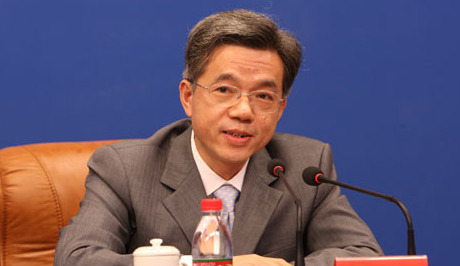|
Taiwan people in Fujian province will gradually be given more say in local political life, a senior local official has said.
Since 2007, some Taiwan people, mostly entrepreneurs in the province, have been invited to attend local committees of the Chinese People's Political Consultative Conference as non-voting delegates to make their voices heard by decision-makers, Deng Benyuan, head of the Taiwan affairs office of Fujian, told China Daily on the sidelines of the National People's Congress session.
 |
| Deng Benyuan, head of the Taiwan affairs office of Fujian |
The practice has been introduced in Fuzhou, Zhangzhou, and Xiamen.
"The practice, highly welcomed by Taiwan people here as a platform to communicate with local decision-makers, will be expanded into more cities in Fujian," said Deng.
More than 100,000 Taiwan people are living and working in Fujian.
"Their need to participate in local political life is increasing and we have to deal with that in a careful manner," Deng said.
"We should work creatively to help meet their needs step by step and also protect them from harm back in Taiwan."
Deng's words refer to the laws and regulations of Taiwan, which ban Taiwan people from involvement in politics in the mainland.
Some local governments in Fujian, facing Taiwan across the Straits, have initiated ways to let Taiwan people be a part of local politics.
On Feb 11, Taiwan people attended the annual sessions of the local people's congress, or local legislature, in Fuzhou and Zhangzhou for the first time.
Some arguments have been that these Taiwan people are not eligible to be local people's congress deputies, because, according to the Constitution, deputies must have Chinese mainland citizenship.
"We don't call them people's congress 'deputies' and we just allow them to audit the sessions, rather than to vote," Deng said.
"We act highly cautiously to involve them in politics."
By the end of 2009, Fujian had approved 10,042 Taiwan-funded enterprises with investments of more than $21 billion.
Deng said Taiwan people have made lots of contributions to Fujian's economic development and that local government should take care of their needs and rights.
In August last year, Zhangzhou officials took the national lead to select eight people from Taiwan who live in the city to be jurors in trials involving Taiwan people, as the number of such cases was on the rise due to more exchanges across the Straits.
"The initiative, launched upon their requests, has helped to improve the transparency of trials involving Taiwan people and boosted their trust in mainland courts and laws," said Zhao Jing, vice-mayor of Zhangzhou.
When asked whether more jurors from Taiwan will come to Fujian, he said: "This is just a pilot project introduced in Zhangzhou and won't be expanded shortly."
By Shan Juan and Hu Meidong
|
